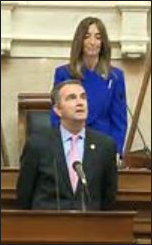Ralph Northam ran for governor as a don’t-rock-the-boat center-left moderate who would continue governance of Virginia in the tradition of his predecessors Terry McAuliffe and Tim Kaine. Virginians bit the bait. Then the blackface scandal happened, and Northam had to do penitence to Virginia’s progressives to survive politically. Subsequently, in what was in part a referendum on an unpopular President Trump, Virginians installed a Democratic Party majority in the General Assembly. I’m not sure Virginians knew what they were getting, but they’re now finding out.
Northam has chosen to govern as a classic tax-and-spend liberal. The Commonwealth’s budget (General Fund and Non General Fund) will have increased from $57 billion as originally submitted in Fiscal 2019 to $68.4 billion by Fiscal 2022, or 20%. That would constitute one of the biggest spending expansions in Virginia fiscal history. (If we adjust for inflation, which is much lower than in the past, it may be the biggest expansion of government in our lifetimes.) Judging from the governor’s State of the Commonwealth address yesterday, there is not a single problem facing Virginia that doesn’t warrant a government solution.
Yet, as much as Northam embraced big government yesterday, his agenda is not as radical as many of his Democratic confreres in the legislature would like. He did not advocate a rollback of the state’s Right to Work law. He believes that corporate investment is a good thing, and that Virginia needs more of it. He did call for a minimum wage increase but did not specify that it had to be $15, as many have called for. Rather than fund every special interest with its hand out, he actually proposes setting aside hundreds of millions of dollars to build the state’s financial reserves to $1.9 billion, enough to safeguard Virginia’s AAA bond rating and provide a financial buffer against a recession.
Here’s a terrifying thought: Given the impotence of General Assembly Republicans, Northam may be the only thing standing between Virginia and a really radical progressive agenda.
Northam’s rhetoric remains moderate in tone. “Capitalism,” he says, “enables more people to live in prosperity than ever.” To many progressives “capitalism” is a dirty word that deserves credit for nothing but racism, sexism, inequality and oppression. “We live at the greatest moment in the greatest state in the greatest country in human history,” he added. By that, I take it, the governor does not embrace the strain of progressive thought as seen in the New York Times 1619 project that regards Virginia and the U.S. as deeply and indelibly stained from their founding by racism and oppression.
The speech also acknowledged that people want a better life, not sweeping institutional change. As he said yesterday, “Virginians want a well-paying job and the chance to get ahead. They want their children to have a world-class education. They want to be healthy. They want to live in a clean environment. They and to be treated fairly, and to participate in our civic life. They want to be safe. And they want an inclusive Virginia, embracing diversity.”
But, despite a decade of economic expansion and record low unemployment, Northam believes that there are many wrongs still to right, and that the answer to every social malady is more money for bigger, better government programs.
While Northam did allude vaguely to higher tobacco and gasoline taxes, at no point did he enumerate the full panoply of tax increases, tax clawbacks, and revenue enhancements that he’s proposing, nor acknowledge how these burdens might make peoples’ lives harder. Big chunks of the spending increases can be attributed to higher charges by colleges and universities as well as federal funding for Medicaid expansion. Some can be attributed to economic growth. How much will come from the citizens in the form of higher taxes and costs cannot be readily deciphered from the budget as submitted. Needless to say, Northam has no motive to tell us. And mainstream journalists show no interest in the subject.
Perhaps my colleague Steve Haner and his friends at the Thomas Jefferson Institute for Public Policy will tot up the tab for taxes, cap-and-trade levies, hospital surcharges for Medicaid, and higher college tuition. Citizens need to know how much they will be coughing up in overt taxes and hidden taxes for Northam’s list of spending initiatives.
Meanwhile, someone needs to ask this question: Will all this extra spending do any good? Will it make one whit of difference in reducing poverty, improving educational outcomes, creating jobs, and improving peoples’s lives? Or do Northam’s spending priorities represent a giant giveaway to left-leaning special interest groups? I’ll be addressing those issues in future posts.



